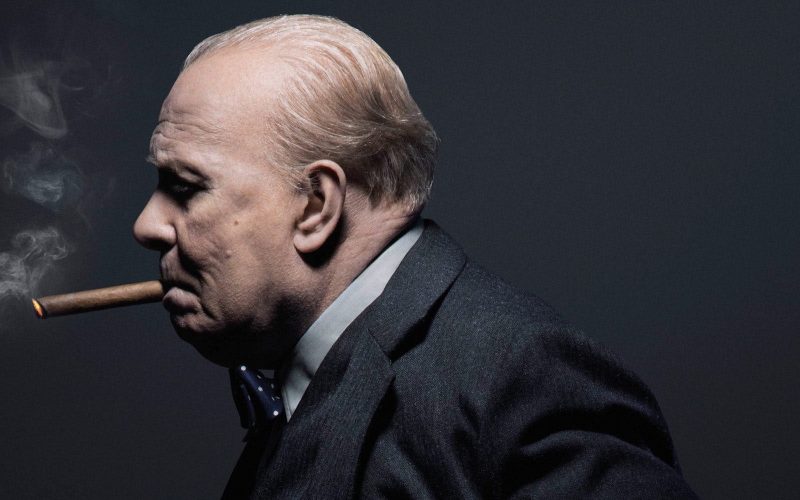Darkest Hour (2017) – Review.
In time honoured tradition, Darkest Hour is a film which fits neatly into the celebrated and quite narrow definition of ‘Britishness’. It is the ‘Britishness’ exemplified by the monarchy, by aristocracy, by posh English accents and by people doing their very best to serve King, Queen and country. National nuance is not allowed because the reality of the state and the empire are not important. It is an idea that all British people (from whatever part of the Empire they’re from) are the same and all support and are inspired by their betters. To quote the great film The Man Who Shot Liberty Valance, lWhen the legend becomes fact, print the legend.”
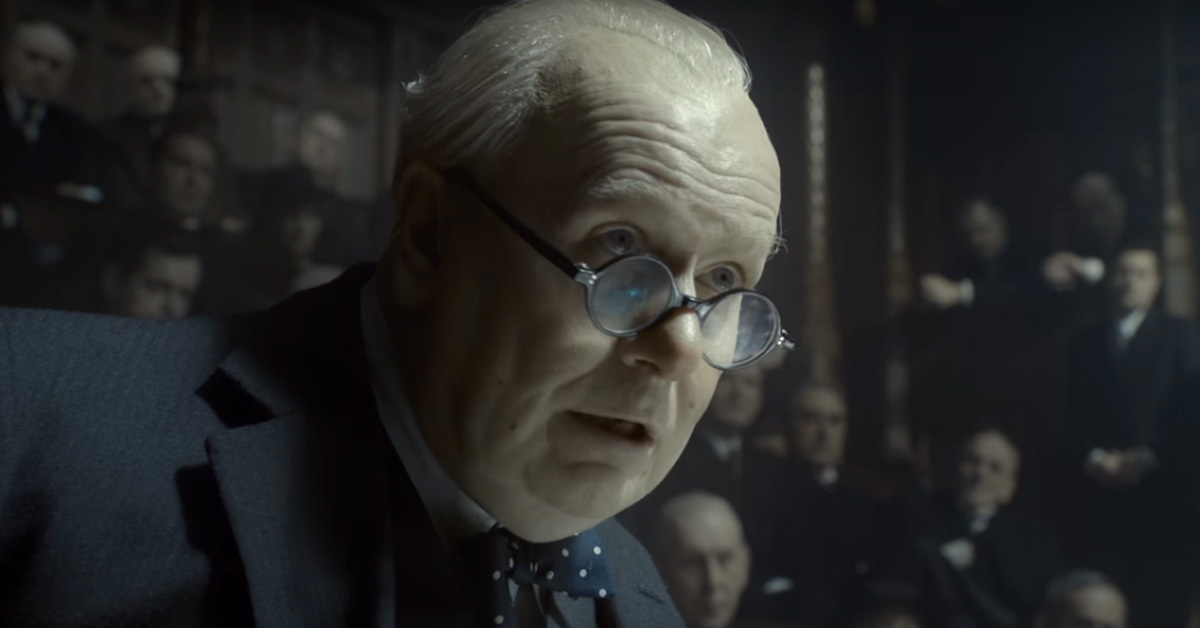 The story begins the day before Winston Churchill becomes Prime Minister. It is 1940 and the Nazis are charging through Europe, pushing back the British Army and taking control of France, Belgium and Holland. The current Prime Minister, Neville Chamberlain, and his right-hand man Lord Halifax want to negotiate with Hitler whereas Churchill wants to fight until the bitter end. Considering the size and scale of the war and the impact it had on the UK, the rest of Europe and the world, the central focus of Darkest Hour is not the war between nations but rather between these political positions. There are a few brief glimpses of combat (usually filmed from above as if we are looking down on them) but the real battle grounds here are in the drab surroundings of the War Room and the very dark and claustrophobic House of Commons. The are no weapons apart from the occasional waved handkerchief, but there are plenty of stabbings in the back.
The story begins the day before Winston Churchill becomes Prime Minister. It is 1940 and the Nazis are charging through Europe, pushing back the British Army and taking control of France, Belgium and Holland. The current Prime Minister, Neville Chamberlain, and his right-hand man Lord Halifax want to negotiate with Hitler whereas Churchill wants to fight until the bitter end. Considering the size and scale of the war and the impact it had on the UK, the rest of Europe and the world, the central focus of Darkest Hour is not the war between nations but rather between these political positions. There are a few brief glimpses of combat (usually filmed from above as if we are looking down on them) but the real battle grounds here are in the drab surroundings of the War Room and the very dark and claustrophobic House of Commons. The are no weapons apart from the occasional waved handkerchief, but there are plenty of stabbings in the back.
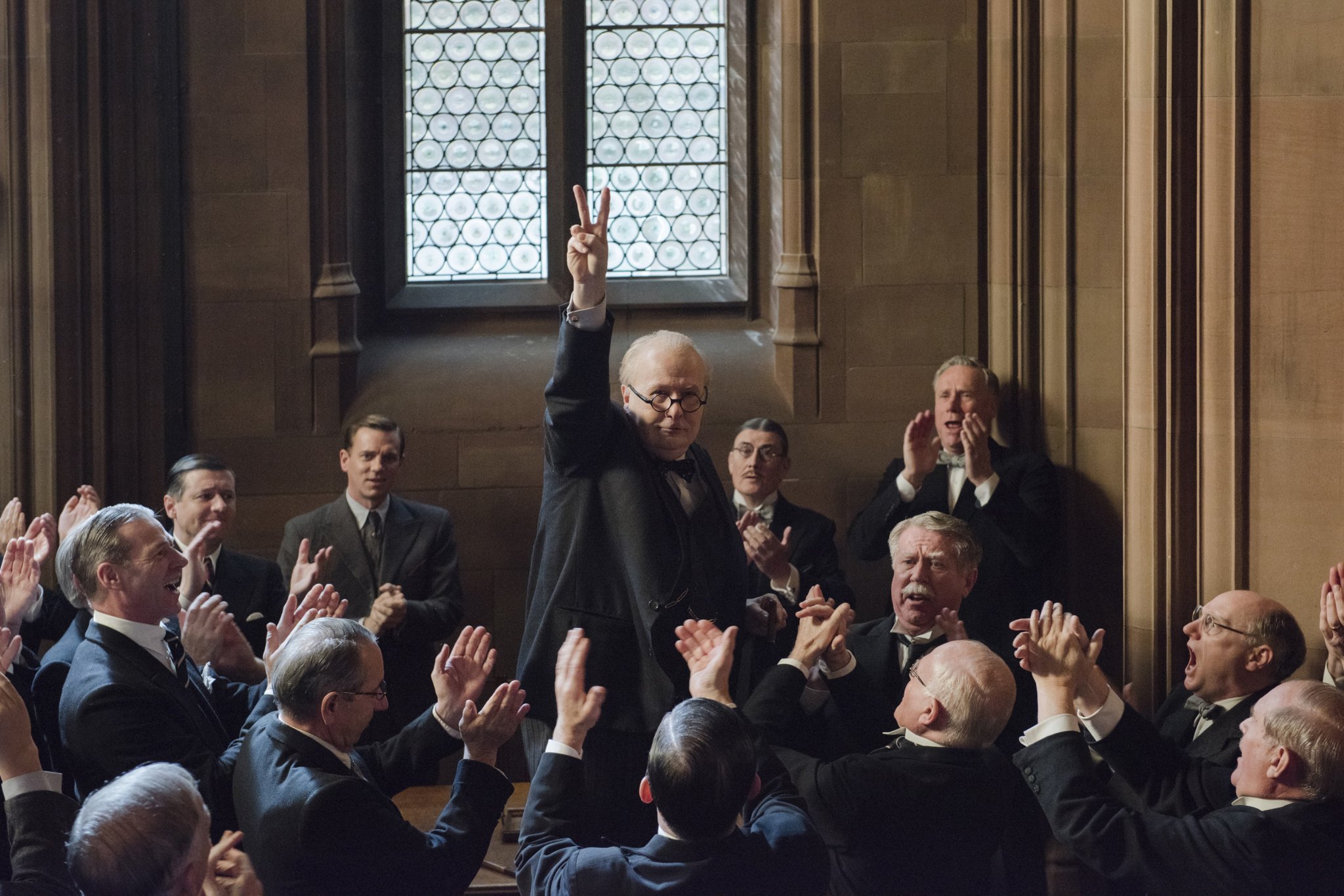 Darkest Hour however, is not an historical film. One of the best scenes, when Churchill decides to skip the official car on his way to Parliament and travel by tube, most certainly didn’t happen. It is there solely to provide a scene in which the Prime Minister and the general public can speak face-to-face. It works because it’s highly amusing and almost inspiring but also because it involves a fictional representation of the PM and not the Churchill of history.
Darkest Hour however, is not an historical film. One of the best scenes, when Churchill decides to skip the official car on his way to Parliament and travel by tube, most certainly didn’t happen. It is there solely to provide a scene in which the Prime Minister and the general public can speak face-to-face. It works because it’s highly amusing and almost inspiring but also because it involves a fictional representation of the PM and not the Churchill of history.
Any portrayal of Winston Churchill would have to overcome a number of obstacles regarding who the real Churchill was. Although he is often mentioned as being the ‘Greatest Briton of all time’, he was not the hero that some would love to remember him as. Amongst other things he was a known racist and misogynist who had unleashed the Black ‘n’ Tans on Ireland, was hated by India and has been blamed for being indirectly responsible for the death of millions of Indians. He defended the use of Concentration Camps in South Africa and he was also blamed for the Gallipoli debacle, which is mentioned throughout.
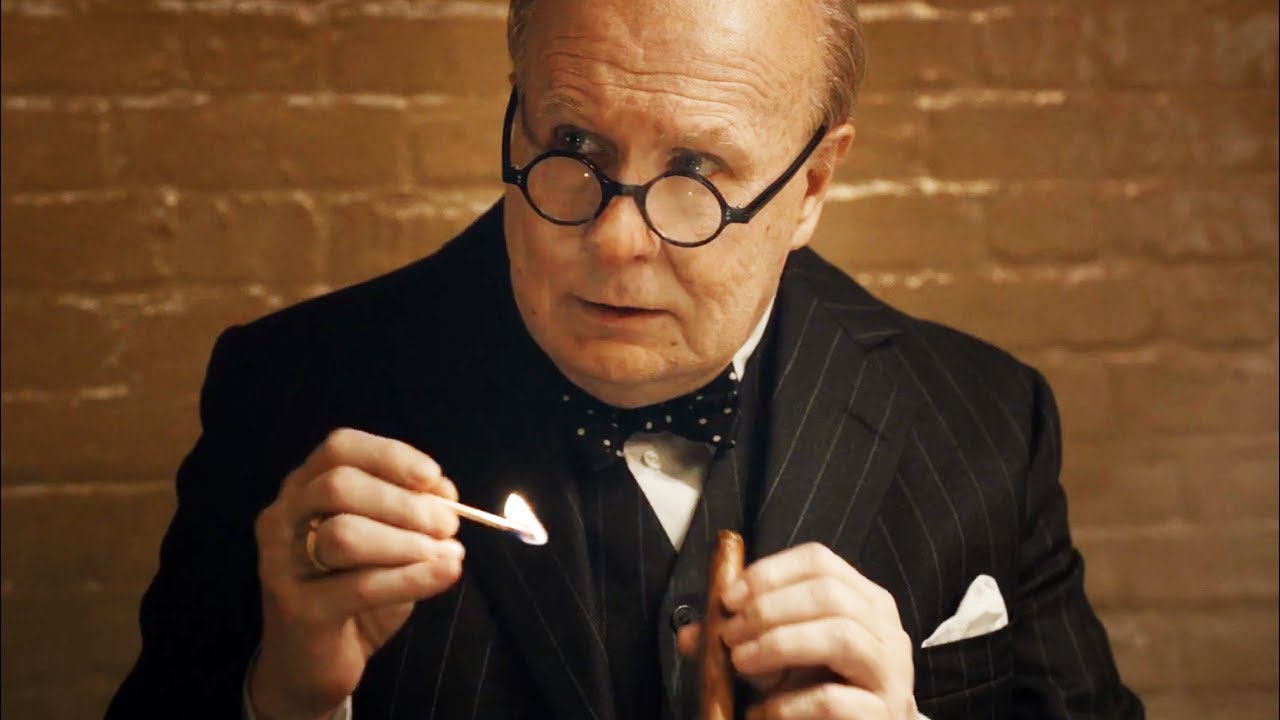 He was also an extremely heavy drinker who treated people with an abruptness which bordered on rude. So how do you make a film about such a flawed man whilst still maintaining his position as a great war hero? Director Joe Wright and screenwriter Anthony McCarten decided to ignore much of it and what they do acknowledge is mentioned just fleetingly so it doesn’t interfere with the story they wanted to tell. As for his personal traits, they make them humorous. His rudeness, his language, his mumbling and his general abrasiveness are reduced to likeable quirks belonging to an eccentric. This is underlined by his fondness for toilet humour and the fact that he will gladly get out of the bath and cross the hall to his bedroom in the nude even though he knows his secretary (who has been on the stairs taking notes that he has been dictating in the bath) is outside.
He was also an extremely heavy drinker who treated people with an abruptness which bordered on rude. So how do you make a film about such a flawed man whilst still maintaining his position as a great war hero? Director Joe Wright and screenwriter Anthony McCarten decided to ignore much of it and what they do acknowledge is mentioned just fleetingly so it doesn’t interfere with the story they wanted to tell. As for his personal traits, they make them humorous. His rudeness, his language, his mumbling and his general abrasiveness are reduced to likeable quirks belonging to an eccentric. This is underlined by his fondness for toilet humour and the fact that he will gladly get out of the bath and cross the hall to his bedroom in the nude even though he knows his secretary (who has been on the stairs taking notes that he has been dictating in the bath) is outside.
The highlight of Darkest Hour has to be Gary Oldman’s performance. He absolutely looks the part and obviously relished the opportunity to play him. It’s not a subtle performance and I would be disappointed if he were to win the Oscar for he role (he has been better in the past) although it is the sort of role that Oscar voters have historically liked. Excellent too is Kristin Scott Thomas as Clemmie Churchill, Ben Mendelsohn as the King George VI, Lily James as the Secretary Elizabeth Leyton, and Stephen Dillane as Churchill’s adversary Lord Halifax.
 Ultimately, whether you enjoy Darkest Hour or not may depend on how you accept this version of Winston Churchill and this idea of ‘Britishness’. If you enjoyed The King’s Speech then I would safely assume you’ll also like this as, even though Dunkirk is central to the story, it has more in common with Tom Hooper’s film than it does with Christopher Nolan’s recent effort. Apart from the aforementioned brief flashes of battle, there is little attempt to make the film more cinematic and, for most of the running time we are presented with little more than a filmed stage play. There is however, one wonderful moment that will probably be missed by most people. Churchill is enjoying his fictitious journey on the tube, talking to the commoners, when he exclaims “Lost causes are often the only causes worth fighting for!” Amongst the people he is talking to are a white woman and a black man. Up until this point they have just been two random people on a train but, on hearing this, they glance at each other and, although nothing is said, it is obvious that they are in a relationship. What the real Churchill would have thought of this I can only guess but it is a beautifully subtle moment that really made me smile. I just wish the rest of the film was like this.
Ultimately, whether you enjoy Darkest Hour or not may depend on how you accept this version of Winston Churchill and this idea of ‘Britishness’. If you enjoyed The King’s Speech then I would safely assume you’ll also like this as, even though Dunkirk is central to the story, it has more in common with Tom Hooper’s film than it does with Christopher Nolan’s recent effort. Apart from the aforementioned brief flashes of battle, there is little attempt to make the film more cinematic and, for most of the running time we are presented with little more than a filmed stage play. There is however, one wonderful moment that will probably be missed by most people. Churchill is enjoying his fictitious journey on the tube, talking to the commoners, when he exclaims “Lost causes are often the only causes worth fighting for!” Amongst the people he is talking to are a white woman and a black man. Up until this point they have just been two random people on a train but, on hearing this, they glance at each other and, although nothing is said, it is obvious that they are in a relationship. What the real Churchill would have thought of this I can only guess but it is a beautifully subtle moment that really made me smile. I just wish the rest of the film was like this.
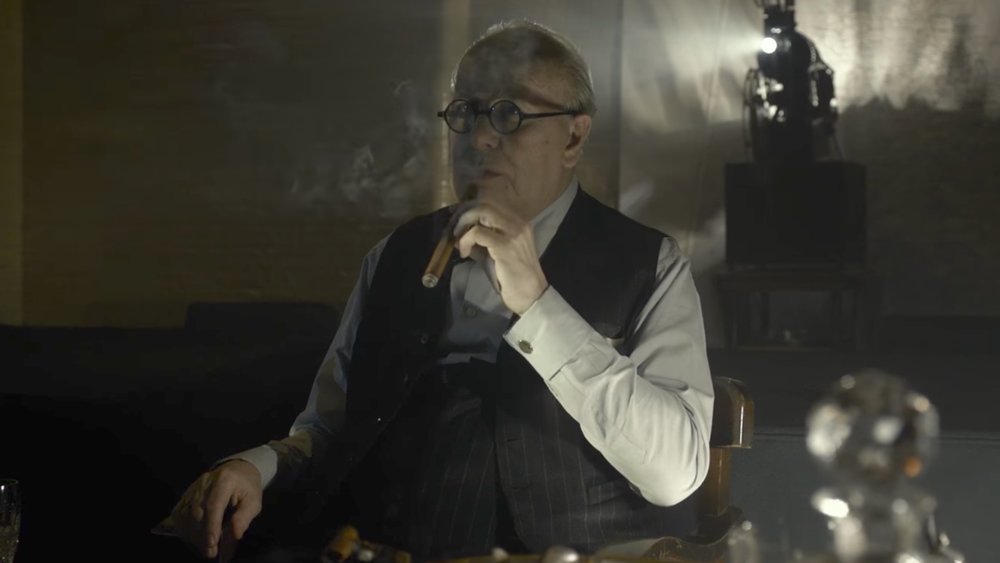 Darkest Hour runs for a little over two hours and it does move along fairly quickly, however, at the end I couldn’t help but wonder if there was more story that should have been told. I felt short changed which, considering I attended a free preview, says a lot about the final film.
Darkest Hour runs for a little over two hours and it does move along fairly quickly, however, at the end I couldn’t help but wonder if there was more story that should have been told. I felt short changed which, considering I attended a free preview, says a lot about the final film.
Film ’89 Verdict – 6/10
Darkest Hour is released in the U.K. January 12th.

